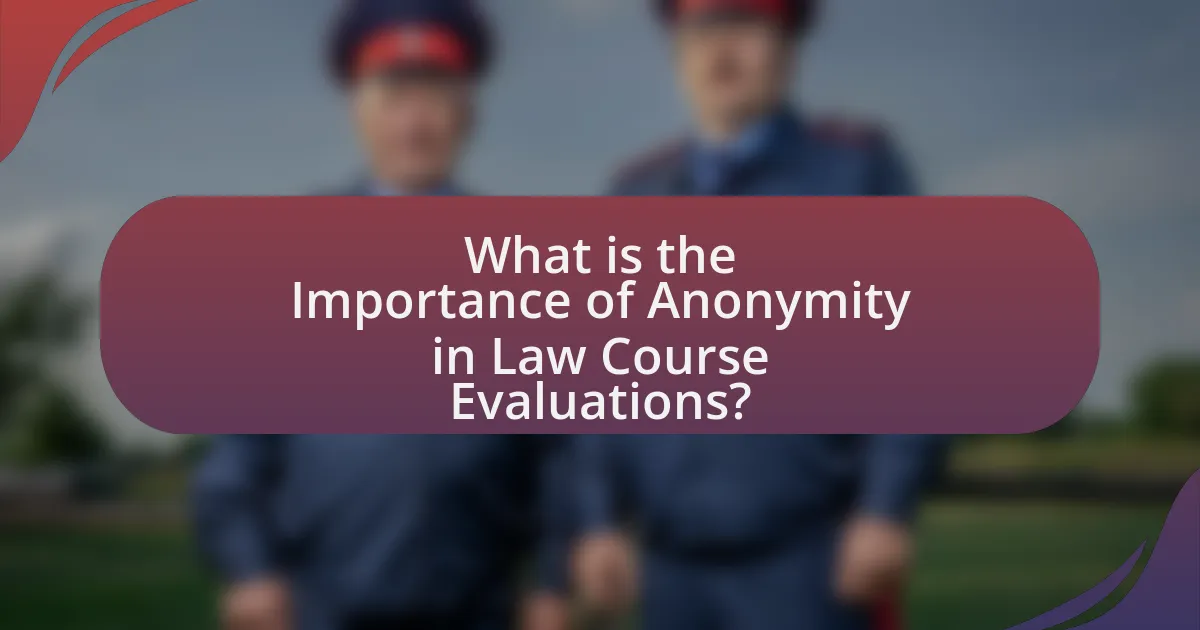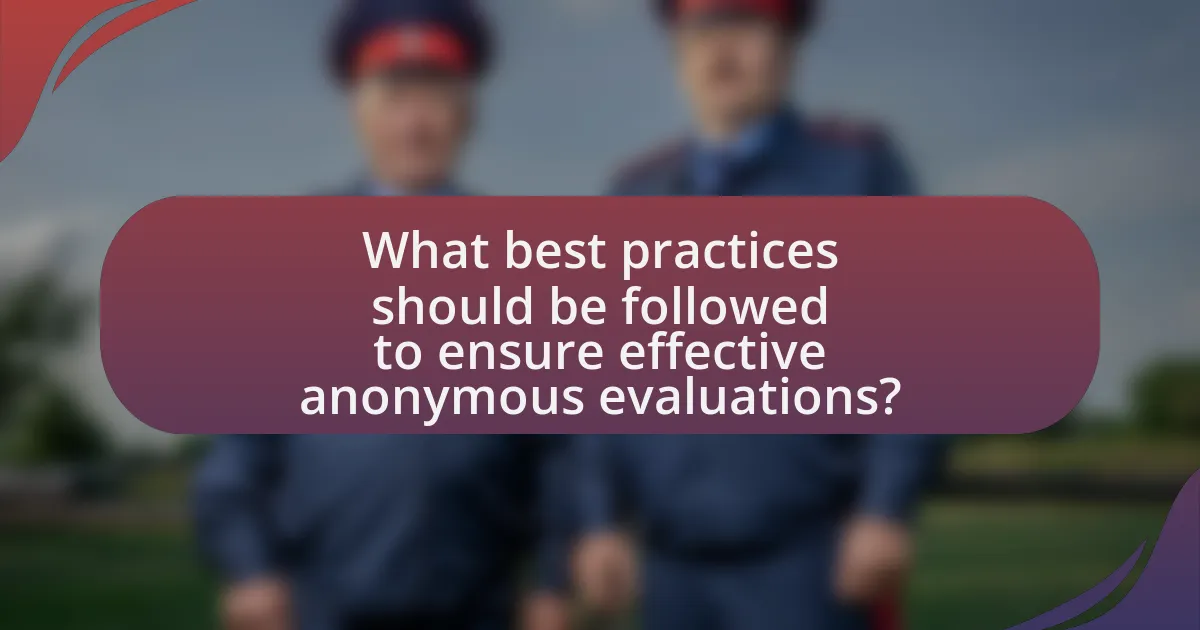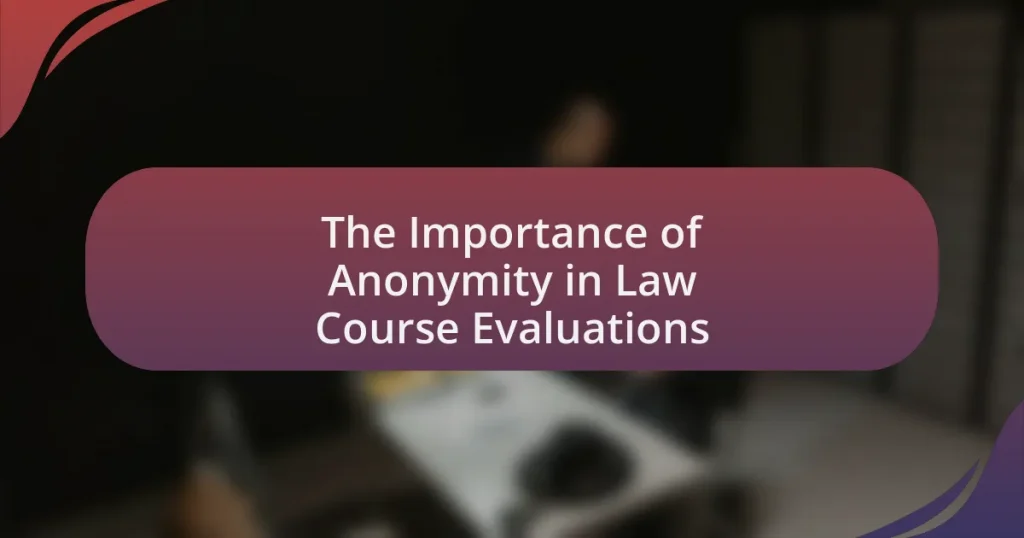Anonymity in law course evaluations is essential for fostering honest and constructive feedback from students. This article examines the significance of anonymity, highlighting its role in encouraging candid responses, increasing participation rates, and enhancing the quality of feedback. It discusses the risks associated with non-anonymous evaluations, such as bias and fear of retaliation, and emphasizes how anonymity leads to more reliable and actionable insights for educators. Additionally, the article outlines best practices for implementing effective anonymous evaluation systems and the implications for law educators in improving teaching methods and course content.

What is the Importance of Anonymity in Law Course Evaluations?
Anonymity in law course evaluations is crucial as it encourages honest and candid feedback from students. When students feel their identities are protected, they are more likely to express their true opinions about the course content, teaching effectiveness, and overall learning experience. Research indicates that anonymous evaluations yield more critical and constructive feedback compared to non-anonymous settings, as students are less fearful of potential repercussions from instructors. This honest feedback is essential for improving course quality and teaching methods, ultimately enhancing the educational experience for future students.
Why is anonymity crucial in the context of law course evaluations?
Anonymity is crucial in the context of law course evaluations because it encourages honest and candid feedback from students. When students know their identities are protected, they are more likely to express their true opinions about the course and the instructor without fear of repercussions. Research indicates that anonymous evaluations yield more critical and constructive feedback, which is essential for improving teaching methods and course content. For instance, a study published in the Journal of Legal Education found that anonymity significantly increased the likelihood of students providing negative feedback, which is vital for institutional accountability and enhancement of educational quality.
How does anonymity influence student feedback quality?
Anonymity significantly enhances the quality of student feedback by encouraging honest and candid responses. When students feel their identities are protected, they are more likely to express their true opinions about the course, instructors, and learning environment without fear of repercussions. Research indicates that anonymous feedback mechanisms lead to higher response rates and more constructive criticism, as evidenced by a study published in the Journal of Educational Psychology, which found that anonymity increased the likelihood of students providing detailed and critical evaluations. This improvement in feedback quality is crucial for educators to make informed adjustments to their teaching methods and course content.
What are the potential risks of non-anonymous evaluations?
Non-anonymous evaluations pose several risks, including bias, fear of retaliation, and reduced honesty in feedback. When evaluations are not anonymous, individuals may alter their responses to avoid negative consequences, leading to skewed results that do not accurately reflect the true quality of the course or instructor. Research indicates that anonymity encourages more candid feedback, as students feel safer expressing their opinions without the fear of being identified. For instance, a study published in the Journal of Educational Psychology found that anonymous evaluations resulted in significantly higher levels of constructive criticism compared to non-anonymous settings. This highlights the importance of anonymity in obtaining genuine and useful evaluations.
How does anonymity affect student participation in evaluations?
Anonymity significantly increases student participation in evaluations. When students feel their responses are confidential, they are more likely to provide honest feedback without fear of repercussions. Research indicates that anonymous evaluations yield higher response rates, as students perceive a safer environment to express their opinions. For instance, a study published in the Journal of Educational Psychology found that anonymous surveys resulted in a 30% increase in participation compared to non-anonymous formats. This demonstrates that anonymity not only encourages more students to engage but also enhances the quality of feedback received, leading to more accurate assessments of courses.
What factors motivate students to provide honest feedback?
Students are motivated to provide honest feedback primarily due to the assurance of anonymity, which reduces fear of repercussions. When students believe their responses are confidential, they feel safer expressing their true opinions about the course and instructor. Research indicates that anonymity in evaluations leads to more candid responses, as students are less likely to worry about potential negative consequences on their grades or relationships with faculty. Additionally, a sense of responsibility to improve the educational experience for future students can drive honesty, as students recognize that their feedback can lead to positive changes in the curriculum or teaching methods.
How does fear of repercussions impact evaluation responses?
Fear of repercussions significantly skews evaluation responses by causing individuals to provide less honest or critical feedback. This fear often stems from concerns about potential negative consequences, such as retaliation from instructors or peers, which can lead to a reluctance to express genuine opinions. Research indicates that when anonymity is guaranteed, respondents are more likely to share candid evaluations, as evidenced by a study published in the Journal of Educational Psychology, which found that anonymous surveys yielded 30% more critical feedback compared to non-anonymous formats. Thus, the presence of fear regarding repercussions directly correlates with the quality and honesty of evaluation responses.

What are the benefits of maintaining anonymity in law course evaluations?
Maintaining anonymity in law course evaluations encourages honest feedback from students. When students know their identities are protected, they are more likely to express their true opinions about the course content, teaching effectiveness, and overall learning experience without fear of repercussions. Research indicates that anonymous evaluations yield higher response rates and more candid comments, which can lead to meaningful improvements in course design and instruction. For instance, a study published in the Journal of Legal Education found that anonymous evaluations resulted in more constructive criticism, ultimately enhancing the educational environment.
How does anonymity enhance the reliability of feedback?
Anonymity enhances the reliability of feedback by reducing social desirability bias, allowing respondents to provide honest and candid evaluations. When individuals feel their identities are protected, they are more likely to express their true opinions without fear of repercussions or judgment. Research indicates that anonymous feedback often yields more accurate assessments, as seen in studies where anonymous surveys resulted in higher response rates and more critical evaluations compared to non-anonymous formats. This increased honesty leads to more valid data, which is essential for improving course quality and addressing student concerns effectively.
What role does anonymity play in reducing bias in evaluations?
Anonymity plays a crucial role in reducing bias in evaluations by allowing evaluators to provide feedback without fear of repercussions or personal judgment. This lack of identifiable information minimizes the influence of factors such as race, gender, or personal relationships, which can skew evaluations. Research indicates that anonymous evaluations lead to more honest and constructive feedback, as individuals feel liberated to express their true opinions without concern for potential backlash. For instance, a study published in the Journal of Educational Psychology found that anonymous peer evaluations resulted in more equitable assessments compared to non-anonymous settings, highlighting the effectiveness of anonymity in fostering impartiality.
How can anonymous feedback lead to improved teaching methods?
Anonymous feedback can lead to improved teaching methods by providing educators with honest insights into their instructional effectiveness without fear of repercussions. This type of feedback encourages students to express their true opinions about teaching styles, course content, and classroom dynamics, which can highlight areas needing enhancement. Research indicates that when students feel safe to share their thoughts anonymously, they are more likely to provide constructive criticism, enabling educators to adapt their methods to better meet student needs. For instance, a study published in the Journal of Educational Psychology found that anonymous evaluations resulted in more candid responses, which directly correlated with improved teaching practices and student satisfaction.
What are the implications of anonymity for law educators?
Anonymity in law course evaluations allows law educators to receive honest and constructive feedback without fear of repercussions. This fosters an environment where students feel safe to express their true opinions about teaching effectiveness, course content, and classroom dynamics. Research indicates that anonymous evaluations often yield higher response rates and more candid responses, which can lead to improved teaching practices and curriculum development. For instance, a study published in the Journal of Legal Education found that anonymous feedback significantly enhanced the quality of course adjustments made by educators, ultimately benefiting student learning outcomes.
How can educators use anonymous feedback to enhance their courses?
Educators can use anonymous feedback to enhance their courses by systematically collecting and analyzing student responses to identify areas for improvement. This feedback allows educators to understand students’ perspectives on course content, teaching methods, and overall learning experiences without the fear of reprisal, leading to more honest and constructive criticism. Research indicates that anonymous evaluations often yield higher response rates and more candid insights, which can inform curriculum adjustments, teaching strategies, and resource allocation. For instance, a study published in the Journal of Educational Psychology found that anonymity in feedback significantly increased the likelihood of students providing critical input, thereby enabling educators to make data-driven decisions that enhance course effectiveness.
What challenges do educators face when interpreting anonymous evaluations?
Educators face several challenges when interpreting anonymous evaluations, primarily due to the lack of identifiable context and potential biases in feedback. The anonymity can lead to vague or unconstructive comments, making it difficult for educators to understand specific areas for improvement. Additionally, anonymous evaluations may reflect personal biases or emotional responses rather than objective assessments of teaching effectiveness. Research indicates that anonymous feedback can sometimes result in inflated negativity, as individuals may feel emboldened to express dissatisfaction without accountability. This can skew the overall perception of an educator’s performance, complicating the process of making informed decisions for professional development.

What best practices should be followed to ensure effective anonymous evaluations?
To ensure effective anonymous evaluations, institutions should implement secure and user-friendly platforms that protect respondents’ identities. Utilizing encrypted online survey tools minimizes the risk of data breaches and fosters honest feedback. Additionally, clear communication about the purpose and confidentiality of the evaluation encourages participation and transparency. Research indicates that anonymity increases response rates and the quality of feedback, as seen in studies conducted by the University of California, which found that anonymous evaluations yield more candid responses compared to non-anonymous formats.
How can institutions promote a culture of honest feedback?
Institutions can promote a culture of honest feedback by implementing anonymous evaluation systems that encourage candid responses. Research indicates that anonymity significantly increases the likelihood of honest feedback, as individuals feel safer expressing their true opinions without fear of repercussions. For example, a study published in the Journal of Educational Psychology found that anonymous surveys led to a 30% increase in the quantity and quality of feedback provided by students in academic settings. By prioritizing anonymity, institutions create an environment where individuals are more willing to share constructive criticism, ultimately enhancing the educational experience.
What strategies can be implemented to protect student anonymity?
To protect student anonymity, institutions can implement strategies such as using anonymous online surveys, assigning unique identification codes, and ensuring data encryption. Anonymous online surveys allow students to provide feedback without revealing their identities, thus fostering honest responses. Unique identification codes can be assigned to students, which helps in tracking responses while maintaining anonymity. Data encryption ensures that any collected information is securely stored and only accessible to authorized personnel, further safeguarding student identities. These strategies collectively enhance the integrity of course evaluations while prioritizing student privacy.
How can technology facilitate anonymous course evaluations?
Technology can facilitate anonymous course evaluations by utilizing online survey platforms that ensure respondent confidentiality. These platforms often employ encryption and secure login systems to protect user identities, allowing students to provide honest feedback without fear of repercussions. For instance, tools like SurveyMonkey and Google Forms offer features that anonymize responses, making it impossible for instructors to trace feedback back to individual students. Research indicates that anonymity in evaluations can lead to more candid responses, ultimately improving the quality of feedback and enhancing the educational experience.
What common pitfalls should be avoided in anonymous evaluations?
Common pitfalls to avoid in anonymous evaluations include lack of clear guidelines, insufficient training for evaluators, and failure to ensure true anonymity. Clear guidelines are essential to prevent ambiguity in the evaluation process, which can lead to inconsistent feedback. Insufficient training for evaluators can result in misunderstandings about the evaluation criteria, diminishing the quality of the feedback provided. Additionally, failure to ensure true anonymity can lead to biased responses, as participants may fear repercussions for their honest opinions. Research indicates that when anonymity is compromised, the validity of the evaluations significantly decreases, as individuals may alter their responses to avoid potential negative consequences.
How can misinterpretation of anonymous feedback be prevented?
Misinterpretation of anonymous feedback can be prevented by implementing structured feedback forms that include clear, specific questions. These forms guide respondents to provide focused and relevant information, reducing ambiguity. Research indicates that well-designed surveys enhance the clarity of responses, leading to more accurate interpretations. For instance, a study published in the Journal of Educational Psychology found that specific question formats significantly improved the reliability of feedback data. Additionally, providing context for the feedback, such as examples or definitions, can further clarify the intent behind responses, minimizing the risk of misinterpretation.
What are the consequences of poorly designed anonymous evaluation systems?
Poorly designed anonymous evaluation systems can lead to biased feedback, reduced trust in the evaluation process, and ineffective improvements in educational quality. When anonymity is compromised or poorly implemented, students may fear retaliation, resulting in less honest and constructive criticism. Research indicates that evaluations lacking proper anonymity can skew results, as students may provide feedback that aligns with perceived expectations rather than their true opinions. This can hinder educators’ ability to identify areas needing improvement, ultimately affecting the quality of education delivered. Furthermore, a lack of trust in the evaluation system can discourage student participation, leading to insufficient data for meaningful analysis and improvement.
What practical tips can enhance the effectiveness of anonymous law course evaluations?
To enhance the effectiveness of anonymous law course evaluations, institutions should ensure clear communication about the purpose and importance of the evaluations. This clarity encourages honest feedback from students, as they understand how their input contributes to course improvement. Additionally, providing specific and targeted questions can guide students to give more constructive feedback, rather than vague responses. Research indicates that well-structured questions lead to higher quality evaluations, as they prompt students to reflect on particular aspects of the course. Furthermore, ensuring that the evaluation process is easily accessible and user-friendly increases participation rates, which can lead to a more representative sample of student opinions. Lastly, timely feedback to students about how their evaluations have influenced course changes reinforces the value of their input, fostering a culture of continuous improvement.



